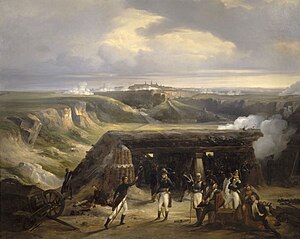Siege of Luxembourg (1794-1795)
| Siege of Luxembourg | |||||||
|---|---|---|---|---|---|---|---|
| Part of the French Revolutionary Wars | |||||||
 Siège de Luxembourg 1794-1795 by Charles Caïus RENOUX |
|||||||
|
|||||||
| Belligerents | |||||||
|
|
|
||||||
| Commanders and leaders | |||||||
|
|
|
||||||
| Strength | |||||||
| 25,500 to 39,000 | 15,000 | ||||||
| Casualties and losses | |||||||
| unknown | 1,200 casualties 12,396, 819 guns captured |
||||||
The siege of Luxembourg was a siege by France of the Habsburg-held Fortress of Luxembourg that lasted from 1794 until 7 June 1795, during the French Revolutionary Wars. Although the French army failed to breach the walls of the city, which were renowned as amongst the best in the world, the fortress was forced to surrender after more than seven months.
Luxembourg's long defence led Lazare Carnot to call Luxembourg "the best [fortress] in the world, except Gibraltar", giving rise to the city's nickname 'the Gibraltar of the North'.
The result of the capture of Luxembourg was the annexation of the Southern Netherlands into France on 1 October 1795. Most of Luxembourg (including all of the modern Grand Duchy), became a part of the département of Forêts, which was created on 24 October 1795.
After taking Rheinfels Castle, the French were masters of the left bank of the Rhine, with the exception of the fortresses of Mainz and Luxembourg. The Committee of Public Safety therefore ordered that both of these should be conquered.
The Army of the Rhine, commanded by General Claude Ignace François Michaud, attacked Mainz, while the Army of the Moselle under Jean René Moreaux dealt with Luxembourg. The French were particularly eager to take this city as they were hoping to find large stocks of provisions and war materials, which they were lacking.
...
Wikipedia
